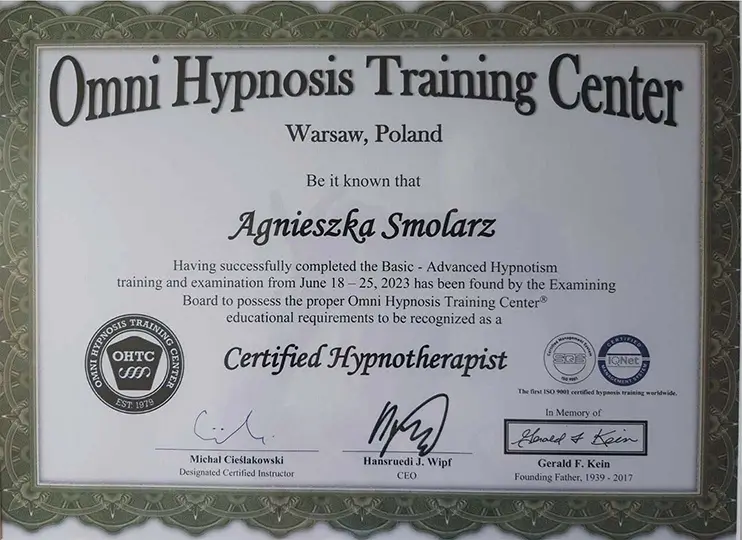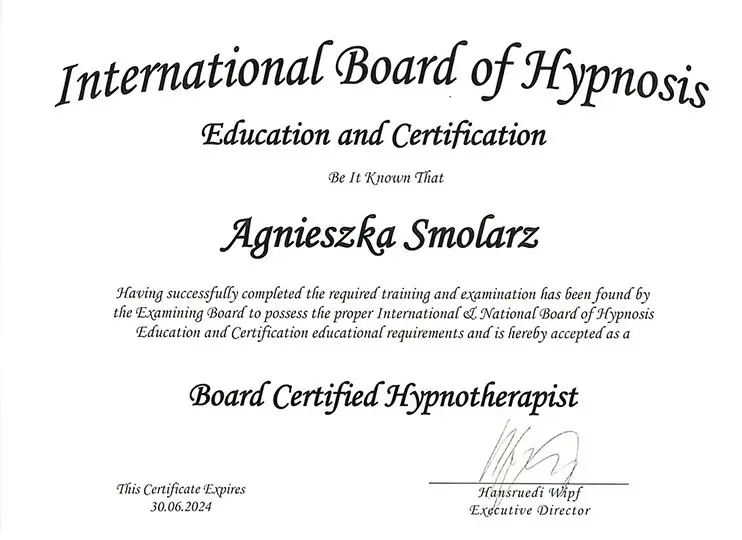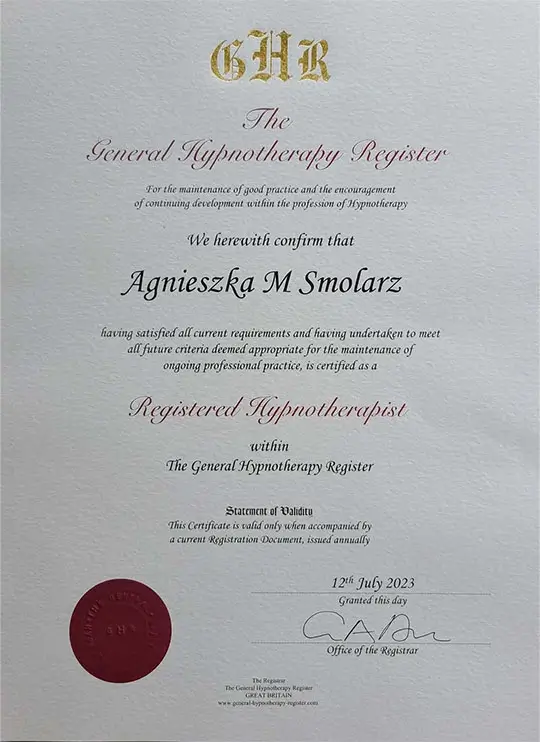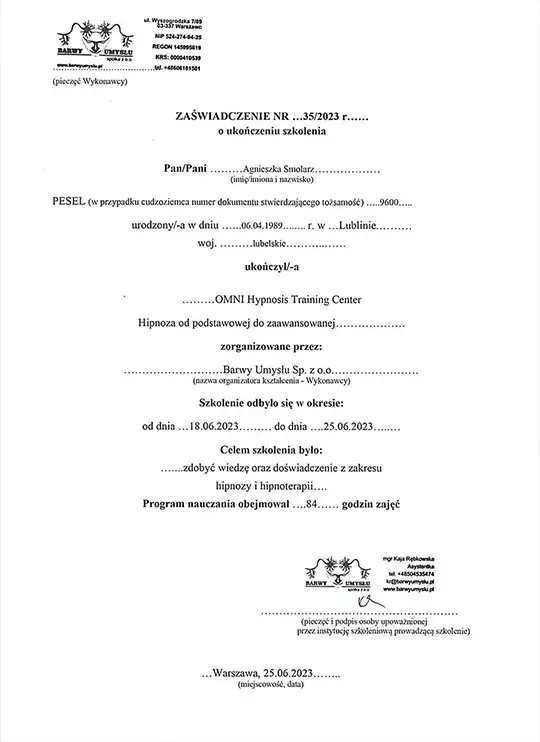"A person is like a sailing ship — it has its sail,
its rudder, and everything needed to set out.
A therapist or a teacher is the gust of wind
that helps the ship reach its destination."
Dr. Milton H. Erickson
About me
let's get to know each other
Welcome!
My name is Agnieszka Smolarz and I am a hypnotist and hypnotherapist. I completed hypnosis training at the world-renowned Omni Hypnosis Training Centre. I work under regular supervision and I am a member of the General Hypnotherapy Register in the UK, which oversees my practice. I constantly upskill through new courses and studies to deepen my understanding of the human mind and the processes within us. My passion includes alternative healing methods, including hypnosis. Hypnotherapy appeared in my life when I was looking for help while experiencing depression. I wanted a fast and, above all, effective way to deal with my emotions. Hypnotherapy turned out to be a success and the results were spectacular. Please make yourself at home and if you have any questions, feel free to contact me — you’ll find the details at the bottom of the page.
I graduated from the best hypnosis school in the world — Omni Hypnosis — which equipped me with knowledge and skills to help others. I have always helped people, and with my hypnotherapist qualification I do it faster and more effectively. My effectiveness is very high.
About hypnosis
what hypnotherapy is and how it works
Hypnosis
Hypnosis is a state of focused attention and increased suggestibility. Hypnotists use various techniques to induce this state, such as guided relaxation, verbal repetition, and visualization. Once in hypnosis, a person may accept suggestions that help change thoughts, behaviours, or feelings to address issues like stress reduction, coping with anxiety, overcoming phobias, or breaking unwanted habits. It is important to understand that hypnosis is not mind control — no one can be forced to do anything against their will during hypnosis. You remain fully in control of your actions and you can accept or reject any suggestions. Hypnosis is used both for therapeutic purposes (hypnotherapy) and for entertainment (stage hypnosis).
Hypnotherapy
Hypnotherapy is a therapeutic method that uses hypnosis to bring the client into a state of deep relaxation and concentration. In this state, the therapist can communicate more effectively with the subconscious and influence unconscious mental and emotional processes. Hypnotherapy is used to address many issues, such as anxiety, phobias, addictions, stress, depression, insomnia, weight problems, chronic pain, and more.
How hypnotherapy works
During a session, the therapist uses relaxation techniques and suggestions to induce hypnosis. In this state, you are fully conscious, but more focused and open to suggestions. The therapist can leverage this suggestibility to help change thoughts, behaviours, and emotions that contribute to your difficulties.
Benefits of hypnotherapy
Hypnotherapy can bring many benefits. Here are some of them:
- Helps manage stress and anxiety.
- Alleviates or reduces symptoms of depression.
- Overcoming habits and addictions.
- Improves sleep and treats insomnia.
- Reduces pain and discomfort related to various conditions.
- Improves self-confidence and self-acceptance.
- Increases motivation and helps achieve goals.
Why choose hypnotherapy?
Hypnotherapy is a non-invasive and safe therapeutic method. It is effective for many people who have not found relief in other traditional forms of therapy. It enables deeper understanding of one’s thoughts, emotions, and behaviours, which often leads to more effective problem-solving. It is also a great choice for those focused on personal growth and reaching their full potential.
If you would like to learn more about hypnotherapy and how it can help in your case, please get in touch. Together we can work on improving your wellbeing and quality of life.
Effectiveness
Setting the right expectations is key to effective hypnosis. The conditions are willingness to follow suggestions and basic knowledge about hypnosis, which I present during the first session.
When these are met, the effectiveness of hypnotherapy exceeds 90%. A goal can be achieved as early as the first session; typically I need two sessions.
Hypnosis is of great interest to researchers and its effectiveness is often studied scientifically.
There are over 13,000 peer-reviewed papers showing positive effects of hypnosis. The effectiveness of hypnosis is 90–97% in areas such as pain and migraines, addictions or weight loss.
Dr. Alfred A. Barrios reviewed the success rates of different psychological approaches over a longer period. The study showed the following:
- Hypnotherapy – 93% success rate after 6 sessions
- Behaviour therapy – 72% success after 22 sessions
- Psychotherapy – 38% success after 600 sessions
(Source: Psychotherapy: Theory Research and Practice, Volume 7, Number 1, Spring, 1970)
The high effectiveness of hypnotherapy stems from the fact that, in trance, we can in simple terms communicate with the subconscious — where emotions reside and where emotional issues are recorded. In hypnosis, we can work at the source, which is why the success rate is so high. We reach the origin of the problem and remove unhelpful habits and beliefs. These are often conflicts and convictions we are not initially aware of. The goal of hypnotherapy is to resolve the issue so it no longer affects you. As a result, certain mechanisms, beliefs, emotions, and conflicts stop influencing your life.
Facts and myths
about hypnosis
What’s true and what isn’t
Fear and misconceptions about what hypnosis is are the only things that block a person from entering hypnosis. Common concerns:
1. Fear of not waking up
During hypnosis you remain conscious — even more than usual — and you do not fall asleep. Your awareness is increased significantly. Hypnosis is not sleep; you are fully present here and now and can leave the state at any time if you wish.
2. “I can’t be hypnotised, I have too much self-control”
Hypnosis is self-hypnosis — you enter the state yourself. We all experience it several times a day (e.g., just after waking up or before falling asleep). You are the one who enters trance; I only guide you if you want to go there. Intelligent people with a vivid imagination and good focus often enter trance more easily.
3. Fear of getting stuck in hypnosis
You can’t get stuck in hypnosis. If you wish, you can end it at any moment — you open your eyes and simply leave the trance.
4. “I’ll lose consciousness in trance”
This is a myth. In hypnosis you are fully aware of what’s happening around you; you know where you are and what is happening to you. Your focus and awareness are higher than outside hypnosis.
5. “A hypnotist can make me do anything”
Not true. You are aware and can say “no”. You accept only suggestions that are right for you and consistent with your values. Only then do they reach the subconscious and start working.
6. “On stage shows people bark — a hypnotist can do everything”
Not true. You accept only suggestions that are good for you. Stage hypnotists know whom to choose for shows; participants are aware and consent to what is suggested or asked of them.
7. “I’m afraid I’ll say something I don’t want to share”
If you don’t want to talk about something, you don’t. You hear the therapist’s questions and decide whether to answer. If you have any concerns or questions, feel free to contact me.
Prices
minimum number of sessions to address an issue: 2
Single session
£150
- one hypnotherapy session
- in-office and online
- 1.5 to 3 hours
Package
£570
- four hypnotherapy sessions
- in-office and online
- each session lasts 1.5–3 hours
Contact
feel free to get in touch
Address
- Start-Up Street Renfrew 7-13 Dunlop Street
Renfrew,
PA4 8PQ,
Scotland - +44 7933972967
- as.asmolarz@gmail.com







Social media
follow me and stay up to date